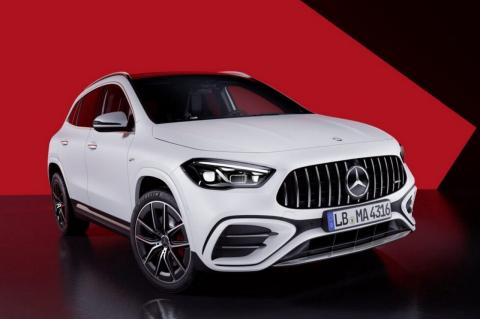The Ford Focus ST has also received a renovation: we face the Hyundai i30 N Performance, the toughest rival in the category
The newly refreshed Ford Focus ST (like the rest of the range) arrives with a cheeky ‘Mean Green metallic’ (evil green) Matrix LED headlights.
The Hyundai i30 N Performance comes with its typical Performance Blue and a full set of LED lights, which come as standard.
Design
The Hyundai adds expensive optional sports seats that don’t create as close a connection to the car as we’d hoped.
The driver sits snug and low and is well integrated into the car, but the steering wheel should be able to be pushed out more. And the side bolsters support much less of the upper body than in the Ford, while the thigh support can’t be extended.
In the Ford, the powerfully contoured upholstery grips much better, almost nothing slips even in fast corners, and the leg rest can also be pulled out, creating an almost perfect “working environment” even for tall drivers. And because the steering wheel can be pulled out a lot, the seating position fits (almost) all sizes.
Inside, both compacts are easy to operate. The new Focus provides information via a digital display on which, in addition to the full-format navigation map, classic pointing instruments can also be displayed.
The conventional buttons are kept for the most important functions, but the percentage of “touches” on the screen is higher than in the i30.
Hyundai goes the more classic route, with round analog instruments and real buttons for important functions. That works pretty well, but voice control sticks to the basics and doesn’t always understand everything.
Engines and behavior
First surprise in terms of driving: Ford has not been able to deliver the ST with the optional seven-speed automatic, but only with a six-speed manual gearbox. The Hyundai comes with its eight-speed dual-clutch box.
Second surprise: The Focus doesn’t seem to like the summer (when we did this test). At temperatures of 30 degrees and above, the 2.3-liter turbo (280 hp and 420 Nm) shows amazing weaknesses. The turbo hole is considerably larger than in its Korean rival, whose two-liter turbocharged four-cylinder mobilizes 280 hp and 392 Nm.
The Hyundai has a lead of 1.11 seconds up to 100 km/h, which increases to 5.3 up to 200. The i30 N engine is more lively and pleasant in all situations, turns more freely and, especially in sport mode, surprise with an inspiring sound.
The sound of the Focus is somewhat more discreet, but also sporty. Its manual transmission doesn’t always fit perfectly and can’t compete with the Hyundai’s excellent DCT.
To the circuit with the i30 N and the Focus ST
On the racetrack, the i30 shines with a consistently tuned chassis (which can also be comfortable in Comfort mode), little body roll, and a helpful electronic lock up front. With hardly any understeer, the Korean comes out of the corners cleanly and manages a good 1:38.69 minutes.
The ST has it much more difficult. Like the engine, the adjustable chassis bites less consistently and allows more body movement, the driver gets less feedback from the front axle and is repeatedly confronted with an early tendency to understeer.
His mark has remained at 1:41.39 minutes. Despite more communicative steering compared to the Hyundai (with too much play in the middle) and brakes with short pedal travel and a clearly defined pressure point, the ST trails by 2.7 seconds, a world in a comparison like this.
Speaking of brakes: With about 36 meters from 100 km / h (hot), none are not covered in glory. With cold discs, the Ford pulls nearly a meter forward (35.5 vs. 36.4 meters).
Factors to decide the purchase
Place 2: Ford Focus ST. A fast compact with good manners and great seats, but too bourgeois on track.
Position 1: Hyundai i30 N Performance. A very agile and fun sports car on and off the track, and perfectly suitable for everyday use.
















